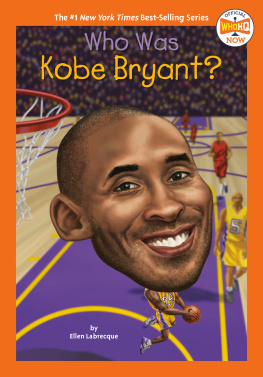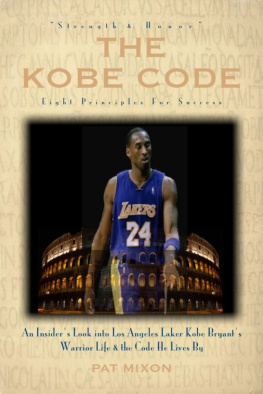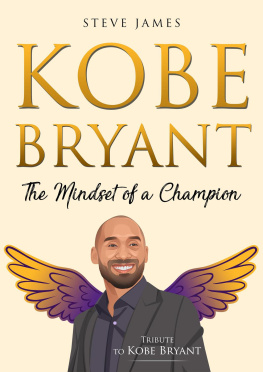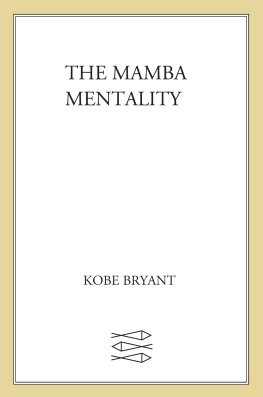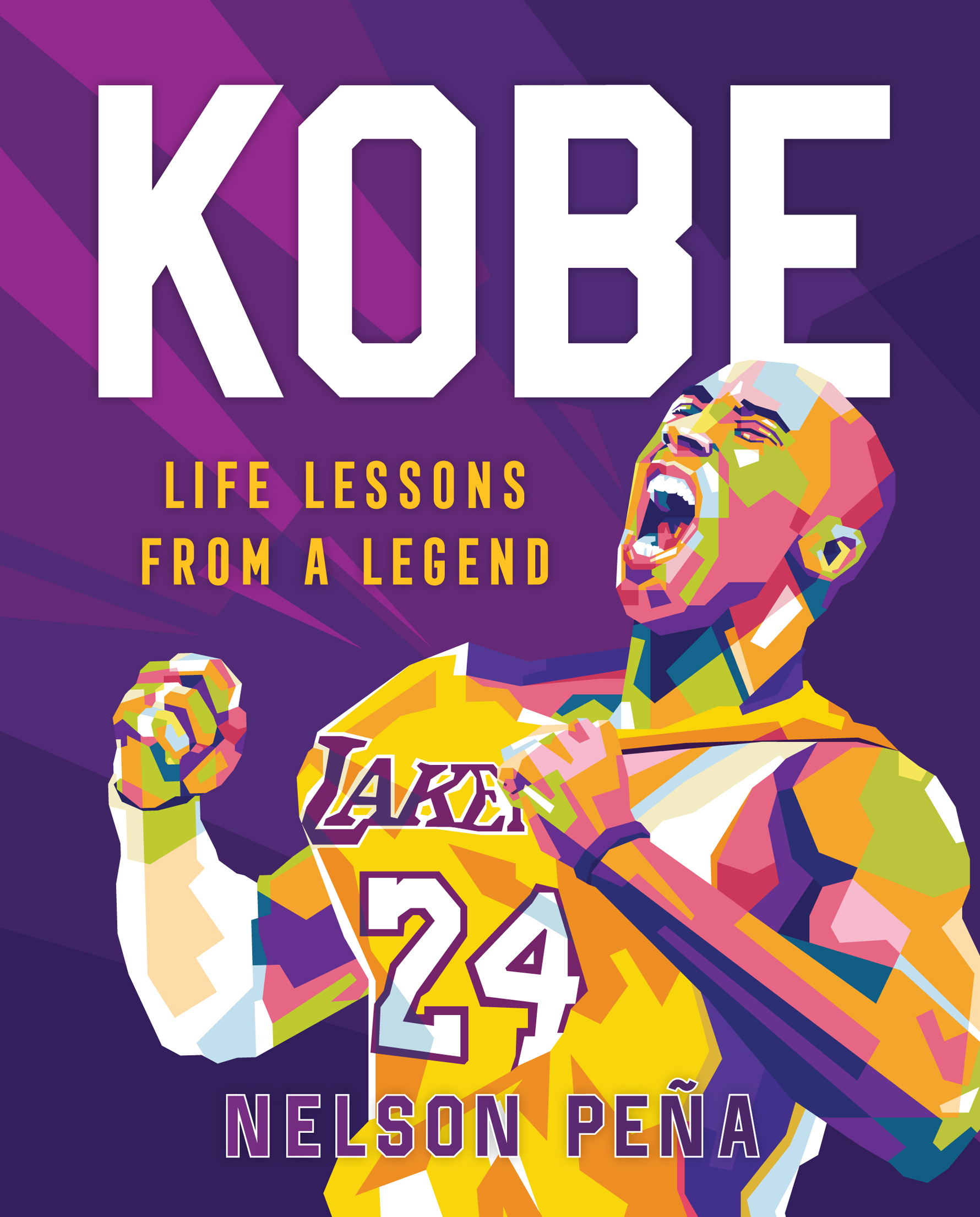The author and publisher have provided this e-book to you for your personal use only. You may not make this e-book publicly available in any way. Copyright infringement is against the law. If you believe the copy of this e-book you are reading infringes on the authors copyright, please notify the publisher at: us.macmillanusa.com/piracy.
THE MOST IMPORTANT THING IS TO TRY AND INSPIRE PEOPLE SO THAT THEY CAN BE GREAT IN WHATEVER THEY WANT TO DO.

Kobe Bryant loved to score . As every hoop fan knows, he once famously put up 81 points in a single game. Later, in his last appearance as a prothe kind of moment when other past-their-prime athletes hope to just play respectably, take a bow, and wave a grateful good-bye to the crowdKobe had other ideas. He scored 60 points. In more than 20,000 NBA games played this century, featuring more than 200,000 starting players, only seven other players have scored 60 points in a game, and none more than once. When Kobe reached 60 in that final, unforgettable game, it was the sixth time he had done it.
More than scoring, though, Kobe loved winning . His high school squad won a state championship. With his next team, the Los Angeles Lakers, he won five NBA championships. Representing his country as part of the U.S. mens basketball team in 2008 and 2012, he won two Olympic gold medals. Overall, he was among the most decorated and successful players in basketball history, a Most Valuable Player and 18-time all-star selection, winning the NBA All-Star Game MVP so often that the league named the award after him.
The truth is, there was something that Kobe loved even more than scoring and winning. Beyond anything else, he loved working toward his goals. For Kobe Bryant, the secret to life was finding something you love and working as hard as possible to become the best at it. Thats the approach he recommended to anyone who asked: Set big, audacious goals and blissfully lose yourself in the journey to get there. Kobe chased greatness. To reach it, he tenaciously and passionately pursued his own self-improvement, and in the process found joy and purpose:
The mindset isnt about seeking a resultits more about the process of getting to that result. Its about the journey and the approach. Its a way of life. I do think that its important, in all endeavors, to have that mentality.
Kobe was a rare and epic blend of intensity, wits, and grace. On the basketball court, he sometimes looked like the perfect player. He was smart and skilled; lean and athletic; fast and aggressive. But he wasnt perfectfar from it. Theres much to learn from Kobe Bryant, but perfection is an illusion, and his story is more real than that. He faced serious struggles, on and off the court. He made major life-altering mistakes that hurt others. Like most people, he failed often. His is a tale of love and passion; perseverance and redemption; and the deep commitment that gives life meaning.

He was a baller. He considered the game his craft and devoted most of his years to reaching its highest level through relentless planning, physical work, mental training, tenacity, and a commitment to continued learning. He developed habits and philosophies that anyone can apply to their life. He paid attention to details and fell in love with the pursuit of excellence. Later he used the same principles that made him a pro athlete on a different quest, a creative one: He was determined to become a legendary storyteller on the level of Walt Disney or J. K. Rowling. He was off to a strong start, winning an Oscar for one of his first efforts, before his life was cut short by a helicopter crash at the age of 41.
Kobe wanted to set a good example and leave a lasting legacy . He didnt always live up to that ambition. But he spent most of his life trying and, ultimately, succeeding. For millions, he was an inspirationexhilarating and unforgettable. There was power in his unfiltered passion and dedication, and something extraordinary about his raw intensitythe way he seemed so certain of his dreams, and so determined to make them real. He believed in paying it forward and spent a lot of time helping others benefit from his experience and approach. Even now, after his passing, his best lessons continue to inspire and teach. All we have to do is look closely at his life to see the crucial ingredients that made him a legend.

Kobe found his love early. His father, Joe Jellybean Bryant, played in the NBA for eight years. Then Joe signed with an Italian team and moved the family to the small, ancient town of Rieti when Kobe was six. For the next seven years, as Joe bounced from one Italian team to another, his son felt like the outsidera Black American kid dropped into Italian culture:
I grew up in isolation, said Kobe. It was not an environment suited to me. I was the only Black kid. I didnt speak the language. Id be in one city, but then wed move to a different city and Id have to do everything again. He learned to be on his own in those years, because he didnt have much of a choice. He came to see that trying to fit in wasnt worth the effort: Id make friends but Id never be part of the group, because the other kids were already growing up together. He learned to speak Italian fluently, but still saw himself as a loner. He tried soccer, where his size made him a natural goalie, but basketball was an even better escape. The more he played, the more he realized that he had discovered something special; something to ease the frustration of feeling overlooked. Something that would create a space just for him:
I had all this anger inside of me that I hadnt really let out. No matter what happened in life, I could always step on to the court and just absolutely erupt. The feeling of playing with that rage was new to me, but I [expletive] loved it. Once I discovered that, everything about the game changed.
When his parents bought him an official leather NBA basketball, he slept with it. He would go to bed in his basketball clothes so that he would be ready in case his dad asked him to tag along for morning practice with the pro team. Joe often brought his son to practice after school, too. Kobes grandfather sent videotapes of American basketball games, and the young player couldnt get enough of them. He showed a curiosity for how the game was played that was unusual for someone of his age. Instead of just collecting basketball cards like his friends, he would study the photos to figure out exactly what moves the players were executing and, as he explained it, which of their muscles were firing to make the move happen. Hed then go about developing those muscles and moves for himself.



